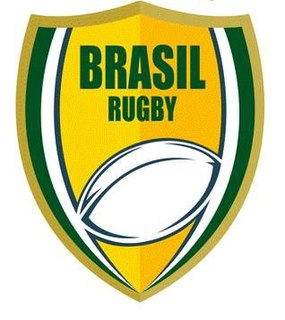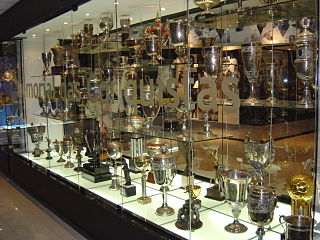
Futsal in Brazil is governed by the Brazilian Futsal Confederation. Although it is not the most popular spectator sport in the country, it is the most practiced.

Futsal in Brazil is governed by the Brazilian Futsal Confederation. Although it is not the most popular spectator sport in the country, it is the most practiced.
Futsal was developed in Brazil and Uruguay around the same time, in 1934 in Uruguay and in the 1940s in Brazil. [1] In Brazil the sport was developed by YMCA of São Paulo due to the lack of available football fields. Basketball courts and hockey posts were used to practice the sport. [2]
In the 1950s, the first state futsal federations were founded, starting with the Federação Metropolitana de Futebol de Salão (Metropolitan Futsal Federation), of Rio de Janeiro state, founded on July 28, 1954, and currently known as Federação de Futebol de Salão do Estado do Rio de Janeiro (Rio de Janeiro State Futsal Federation), [2] followed by the state federations of Minas Gerais, also founded in 1954, São Paulo, in 1955, Ceará, Paraná, Rio Grande do Sul and Bahia in 1956, and several others in the subsequent years. [1]
On June 15, 1979, the Brazilian Futsal Confederation was founded, in Rio de Janeiro, after the Brazilian Sports Confederation (CBD), which was the responsible for the administration of several sports, folded. The founding states were Acre, Alagoas, Amapá, Amazonas, Bahia, Ceará, Distrito Federal, Espírito Santo, Goiás, Paraíba, Paraná, Pernambuco, Maranhão, Mato Grosso, Minas Gerais, Rio de Janeiro, Rio Grande do Norte, Rio Grande do Sul, Santa Catarina, São Paulo, and Sergipe. On August 27 of that year, Aécio de Borba Vasconcelos was elected as the organization's first president, and Fortaleza was chosen as its headquarters. [3]
Futsal is played by most children in Brazil at some point. It combines the fast play and individual talent that is typical of Brazilian football. Many professional football players from Brazil started playing futsal. Perhaps the most notable of these were Falcão and Ronaldinho.
The Brazilian national team is very successful, winning several titles, such as the FIFA Futsal World Cup, the South American Futsal Championship, the Grand Prix de Futsal, and the Futsal Mundialito. Brazil also won the first edition of the sport at the Pan American Games, in 2007.
The team was on a 167-game winning streak and was recently ended by Spain at the Grand Prix.
There are two national competitions, which are the Liga Futsal, and the Taça Brasil de Futsal. Liga Futsal started in 1996, [4] while Taça Brasil de Futsal is the oldest national futsal competition in Brazil, and started in 1968. [5] Also, each state federation organizes its own state championship.
The Campeonato Carioca, officially known as Campeonato Estadual do Rio de Janeiro, was started in 1906 and is the annual football championship in the state of Rio de Janeiro, Brazil. It is under the authority of the FERJ or FFERJ.
The Torneio Roberto Gomes Pedrosa, also known as Taça de Prata, or nicknamed Robertão, was an association football competition contested in Brazil between 1967 and 1970 among soccer teams from São Paulo, Rio de Janeiro, Rio Grande do Sul, Minas Gerais and Paraná states. It was an important soccer tournament, being considered a predecessor to the Brazilian Championship induced in 1971. Thus in 2010 the Brazilian Football Confederation decided to consider the winners of the Robertão as Brazilian champions. The 1st edition of the tournament was organized by Federação de Futebol do Estado do Rio de Janeiro and Federação Paulista de Futebol.
The Campeonato Brasileiro de Futebol Feminino is an annual Brazilian women's club football tournament organized by the Confederação Brasileira de Futebol, or CBF. It is the country's premier women's football competition.

The Brazilian Athletics Confederation is the governing body for the sport of athletics in Brazil. President for the period 2013-2016 is José Antonio Martins Fernandes.

The Brazilian Rugby Confederation is the governing body for rugby union in Brazil, founded in 2010. It is the successor of the União de Rugby do Brasil and the Associação Brasileira de Rugby. It became a member of the International Rugby Board in 1995.

The Confederation of the Equator was a short-lived rebellion that occurred in the northeastern region of the Empire of Brazil in 1824, in the early years of the country's independence from Portugal. The secessionist movement was led by liberals who opposed the authoritarian and centralist policies of the nation's first leader, Emperor Pedro I. The fight occurred in the provinces of Pernambuco, Ceará and Paraíba.

Rio Preto Esporte Clube, commonly referred to as Rio Preto, is a Brazilian professional association football club based in São José do Rio Preto, São Paulo. The team competes in the Campeonato Paulista Série A3, the third tier of the São Paulo state football league.

Botucatu Futebol Clube, usually known simply as Botucatu, is a Brazilian women's football team, from Botucatu, São Paulo state.
The Taça Brasil de Futsal is a Brazilian futsal championship. It was the only futsal competition in Brazil until 1996, when the Liga Futsal started.

Santos FC is a football club based in Santos, that competes in the Campeonato Paulista, São Paulo's state league, and the Campeonato Brasileiro Série A or Brasileirão, Brazil's national league. The club was founded in 1912 by the initiative of three sports enthusiasts from Santos by the names of Raimundo Marques, Mário Ferraz de Campos, and Argemiro de Souza Júnior, and played its first friendly match on June 23, 1914. Initially Santos played against other local clubs in the city and state championships, but in 1959 the club became one of the founding members of the Taça Brasil, Brazil's first truly national league. As of 2010, Santos is one of only five clubs never to have been relegated from the top level of Brazilian football, the others being São Paulo and Flamengo.

Events in the year 1904 in Brazil.
The Copa dos Campeões Estaduais, the "Cup of State Champions," was a competition for Brazilian association football clubs held in the years 1920 and 1936. In the absence of other notable national competitions, the winners considered themselves champions of Brazil. Participants were the champions of the states considered the then leading forces in Brazilian football.
The 2016 Copa do Brasil Finals were the final two-legged tie that will decided the 2016 Copa do Brasil, the 28th season of the Copa do Brasil, Brazil's national cup football tournament organised by the Brazilian Football Confederation. The finals were contested in a two-legged home-and-away format between Atlético Mineiro, from Minas Gerais, and Grêmio, from Rio Grande do Sul. The latter were crowned champions by an aggregate score of 4–2.
The Brazilian Sports Confederation, also known by the acronym CBD, was the main sports confederation of Brazil, competent in the matter of tennis, athletics, swimming, water polo, handball, football, and any sporting activity not belonging to a self-standing institution. Football played a prominent role since the statute stated that it constituted "the basic and essential sport of the Confederação Brasileira de Desportos". The CBD was born to overcome the contrasts between the Federação Brasileira de Futebol (FBF) and the Federação Brasileira de Sports (FBS), the two bodies that competed for hegemony in the organization of football in the country, an expression of the State of Sao Paulo and State of Rio de Janeiro football movement respectively. The establishment of the CBD led to the extinction of the two state entities on 21 June 1916, and in the same year, there was affiliation to the South American Football Confederation. On 20 May 1923, it obtained affiliation to the FIFA. The Confederation also represented most of the Brazilian states in the sports sector. Today dissolved, in terms of football, its attributions and functions have been conferred on the Confederação Brasileira de Futebol (CBF), built in 1979.
The São Paulo state football team represents São Paulo in association football.